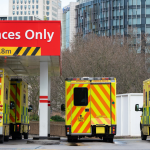Fraud and error overpayments in the benefits system reached record levels last year, fuelled by bogus Universal Credit claims.
The Department for Work and Pensions (DWP) estimates it overpaid £5.5bn of Universal Credit in 2020-21, with checks relaxed to ensure a record number of new claims could be processed and paid.
The department said the COVID-19 pandemic and subsequent relaxation of these checks were the main drivers of the increase in overpayments, with the DWP estimating these factors accounted for £3.8bn in overpayments.
The number of people claiming Universal Credit doubled amid the pandemic, rising from three million to six million.
According to the National Audit Office (NAO), many new claimants had more complex claims, such as self-employed income, which are more vulnerable to fraud.
Several organised criminal attacks were also seen during the pandemic, with fraudsters targeting Universal Credit in particular and submitting claims in other people’s names.
Overall, the DWP estimates it overpaid £8.3bn (7.5%) out of £114bn of benefits excluding the state pension in 2020/21.
This is an increase of £3.8bn since 2019/20.
According to the NAO, Whitehall’s spending watchdog, this is the highest rate since records began in 2005.
“I am concerned that the level of fraud and error in the benefits system continues to increase year on year, now reaching its highest level since records began,” Gareth Davies, the head of the NAO, said.
“This has a real impact on public funds and on those who face deductions to their income due to overpayments.
“I recognise that the pandemic and the resulting surge in the number of claimants has increased DWP’s exposure to fraud and error.
“It must now review all cases that could have been subject to fraud during this time, whilst continuing to progress our past recommendations on how to reduce fraud and error.”
A DWP spokesperson said: “Following an unprecedented year in which the number of Universal Credit claimants doubled as a result of the pandemic, fraud and error in the benefits system remains low with 95% of benefits worth more than £200bn paid correctly.
“Our priority when the outbreak hit was to make sure money reached claimants – those most in need at a challenging time – as soon as possible and we are now reviewing suspicious cases.
“Those found to have claimed benefits to which they are not entitled face criminal investigation.”
In addition, the DWP is owed £5bn of overpayments, which is putting extra strain on its resources and potentially creating uncertainty and hardship for claimants.
It has also emerged that ongoing failings mean an estimated 132,000 pensioners are getting less state pension than they are entitled to.
A pot of £1bn has been set aside to reimburse individuals who have been underpaid over the past 30 years.
The department is working to review all the cases and pay pensioners their correct amounts by the end of 2023.
The NAO said the estimated level of fraud and error in the state pension every year remains lower than for other benefits.
The DWP estimates it will need at least an extra 3,000 extra staff to deal with its workload as it emerges from the pandemic, with the level of overpayments, excluding the state pension, to stay higher than normal for a while.
According to the NAO, the DWP should identify and review all fraud cases caused by relaxing controls and then engage in quick and clear communication with claimants about any money they owe as a result of overpayments.
The watchdog also said the department should carry out a lessons learned exercise into its approach during the pandemic.






















